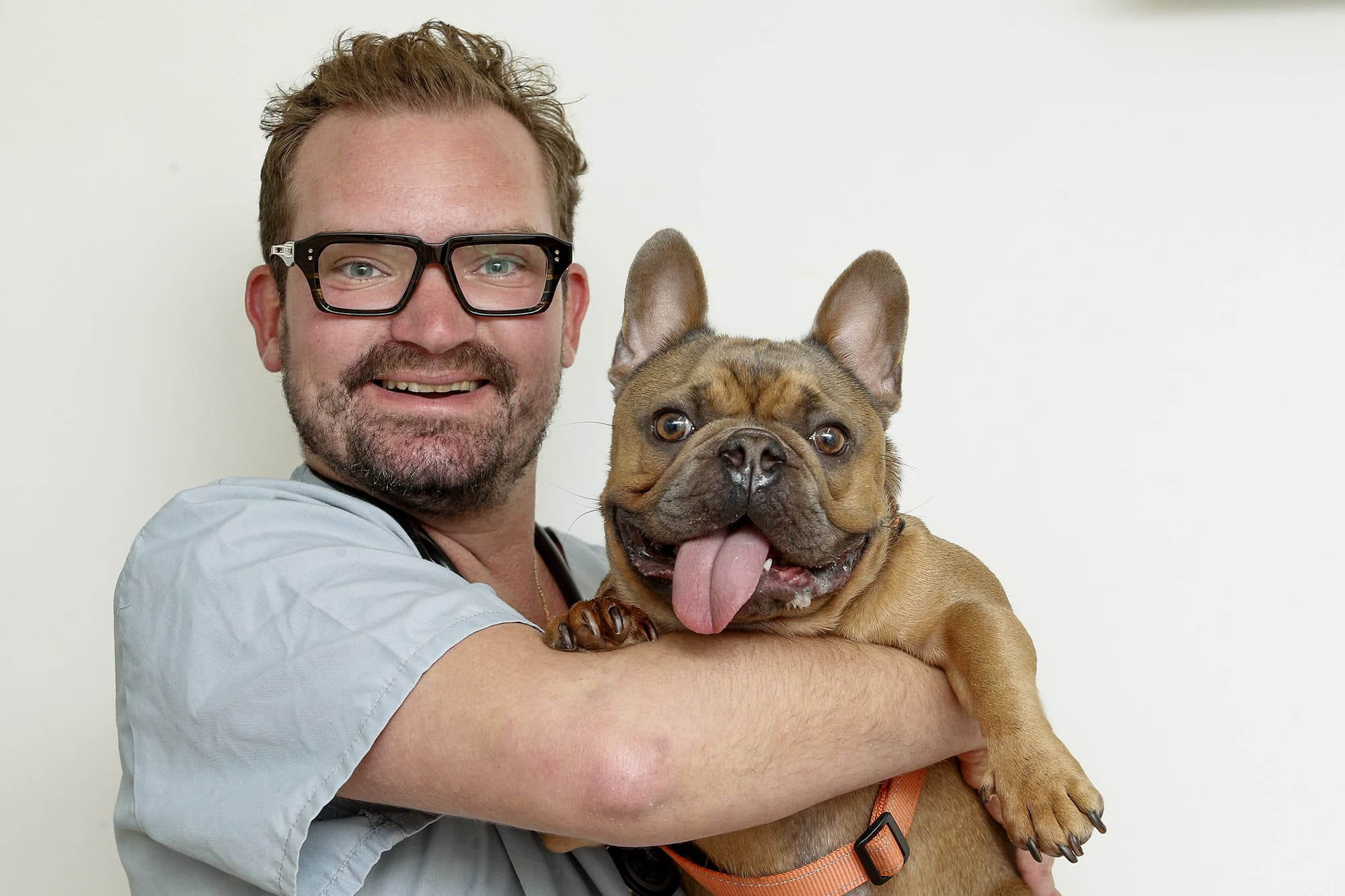
23 Sep The 10 Most Common French Bulldog Health Problems in 2025
Picture this: your little guy zooming around the backyard with that signature snort, those bat ears flapping like tiny wings. It’s pure joy, right? French Bulldogs have climbed to the third most popular dog breed spot in Australia, and honestly, who can blame us? Their affectionate vibes and fun personality make them impossible to resist. But let’s keep it real for a second. That flat face and stocky build we adore? They come from years of selective breeding, and they can bring some health challenges along for the ride. If you’re a proud parent or eyeing your first Frenchie, arming yourself with this knowledge is like giving your pup a superpower – a longer, happier life.
We’ve spent years treating these wrinkly wonders at Southern Cross Vet, seeing firsthand how early awareness turns potential headaches into easy wins. Today, we’re diving into the top 10 health issues Frenchies face, based on the latest vet insights. We’ll share spot-on symptoms, simple prevention tips, and when to call in the pros. And stick around for the scoop on BOAS – we’ve got some cutting-edge options here that could change everything for your buddy. Ready? Let’s jump in.
1.Allergies
You know that constant paw-licking or ear-rubbing that drives you nuts? Allergies hit Frenchies harder than most breeds, thanks to their genetics. Food triggers top the list, but environmental ones like pollen sneak in too. Think of it as your Frenchie’s body throwing a tantrum over something harmless.
Watch for excessive scratching (especially paws), red hotspots, watery eyes, sneezing, or tummy troubles like diarrhea and vomiting. If you spot these, don’t play detective solo – head to your vet for allergy testing. They might suggest a hypoallergenic diet swap or meds to dial down the drama. Pro tip: Track symptoms in a quick journal to make that vet visit smoother.
2.Skin Fold Dermatitis
Ah, those adorable face folds – the envy of every smooth-skinned pup. But they can trap moisture and gunk, turning into a breeding ground for irritation. It’s like a cozy trap for bacteria, and Frenchies are pros at falling into it.
Look out for nonstop scratching around the face, armpits, or tail base, plus red, sore patches. Prevention is your best friend: Gently clean those folds daily with vet-approved wipes or a mild antiseptic solution, then pat dry. It’s a five-minute routine that keeps infections at bay and your Frenchie comfy.
3.Pyoderma
Ever notice a small scratch on your Frenchie turning into a red, crusty mess? Pyoderma is basically a bacterial takeover, often sparked by those same skin folds we just talked about. It’s super common in our wrinkly pals and flares up fast if ignored.
Signs include itchy wounds, hair loss, pus, or that telltale redness. The fix? Your vet will prescribe antibiotics – topical creams for mild cases, pills for tougher ones. Catch it early, and it’s gone in a flash. To dodge it altogether, keep nails trimmed and folds spotless. Your Frenchie will thank you with extra cuddles.
4.Otitis Externa
Frenchies’ flat faces mean narrower ear canals, which trap warmth and moisture like a sauna. That setup invites yeast and bacteria to party, leading to infections that make your pup miserable.
You’ll see head-shaking, frantic scratching, red ears, or waxy buildup. Don’t reach for cotton swabs – they can push gunk deeper. Instead, ask your vet to demo safe cleaning with pet-safe solutions. Regular check-ins keep ears happy and prevent those vet bills from piling up.
5.Conjunctivitis and Corneal Ulcers
Those big, soulful eyes are a Frenchie hallmark, but they’re also magnets for trouble. The flat face exposes them more, making pinkeye from allergies or irritants a frequent guest. Ulcers? That’s scratches on the cornea, often from dust or rough play.
Spot swollen, red eyes with discharge, or your pup pawing and squinting? Rinse gently with saline and book a vet eye exam stat – ulcers can worsen quick. Daily face wipes around the eyes and avoiding dusty spots help prevent the fuss.
6.Brachycephalic Obstructive Airway Syndrome (BOAS)
Okay, let’s pause and breathe deep – because BOAS is the heavy hitter for every Frenchie. That squished snout shortens the soft palate and narrows nostrils, choking airflow like a kinked hose. All our flat-faced friends deal with some level of it, and it ramps up with age or heat.
Noisy breathing, snoring (even asleep), gagging, or tiring out on short walks? Those are red flags. Weight management helps, but for real relief, your pet would probably need surgery. Now, here’s where it gets exciting: At Southern Cross Vet Sydney, we’re leading the pack with minimally invasive BOAS surgery using radiofrequency technology and the Caiman handpiece. Forget the traditional CO2 lasers other clinics rely on – our method slashes surgery time, cuts pain and bruising, and gets most pups home the same day. Absolutely NO OVERNIGHT STAYS!
At Southern Cross Vet, we offer a free breathing assessment to map your Frenchie’s exact needs, ditching the one-size-fits-all approach. Additionally, every procedure includes a full-time veterinary anaesthetist whose sole job is to monitor your pet’s vitals when they are under anaesthesia, allowing our surgeon to focus on the surgery and allowing your Frenchie to breathe better than ever before!
Book an appointment with us now by calling 1300 DOC SAM (1300 362 726) or by heading to scvet.com.au/book.
7.Heat Stroke
Did you know Frenchies overheat twice as fast as long-nosed breeds? Their airway quirks make cooling off a challenge, turning a sunny stroll into a crisis.
Panting like crazy, bright red or blue gums, vomiting, or wobbling? Act fast: Move to AC, run cool (not ice-cold) water over their neck and belly, and call your vet. Prevention? Skip midday walks, provide shaded water bowls, and use cooling mats. Your vigilance could save the day.
8.Patella Luxation
Small breeds like Frenchies often inherit wobbly kneecaps that pop out of place, causing that funny skip in their step. It’s genetic, but jumping off furniture speeds it up.
Notice limping, bunny-hopping, or sudden hind-leg drags? X-rays confirm it, and surgery to deepen the groove fixes most cases. Untreated, it invites arthritis. Keep pups lean and limit high jumps to keep those knees steady.
9.Hip Dysplasia
This one’s a sneaky genetic glitch where the hip socket doesn’t form right, leading to grinding and pain as your Frenchie ages. Extra pounds or over-exercise in puppyhood crank up the risk.
Bunny-hopping gait, trouble rising, or stair avoidance? Vets diagnose via exams and imaging. Joint supplements, weight control, and controlled play slow it down – but early intervention is key to pain-free golden years.
10.Intervertebral Disc Disease (IVDD)
Frenchies’ short legs and long backs scream IVDD risk – discs bulge and pinch nerves, sparking pain or worse. It often strikes after age 2-3.
Dragging paws, hunched posture, yelps on touch, or sudden paralysis? Emergency vet time – steroids and rest help mild cases, surgery severe ones. Help prevent it: Maintain ideal weight, skip furniture leaps, and use ramps. It’s a game-changer for mobility.
Whew, we made it through the list! Remember, picking an ethical breeder with health-tested parents slashes many risks, but no Frenchie is bulletproof. Pet insurance? Total no-brainer for covering those surprise bills from breeding quirks. You’re already an amazing advocate just by reading this – keep that love flowing.
Got a Frenchie facing these hurdles? At Southern Cross Vet, our team’s obsessed with these breeds. We’re especially proud of our BOAS expertise – that free assessment could be your next step to easier breaths. Book today and let’s team up for your pup’s best life.
For anything else, and if your Frenchie needs any other help, support or treatment, we at Southern Cross Veterinary Clinic Sydney are always available. Just give us a call at 1300 DOC SAM (1300 362 726) to speak to one of our friendly team members and we will be happy to assist.
Remember we are always there for your pets when you need us.
Author
Dr Sam followed his dream of becoming a veterinary surgeon which began at age three. Since then, he has developed a strong interest in oncology, internal medicine and animal behaviour. Dr Sam continues his passion for providing the most up-to-date care to his patients and their two-legged family.
References
- PetMD. (2023). 23 French Bulldog Health Issues Pet Parents Should Know About. https://www.petmd.com/dog/general-health/french-bulldog-health-issues
- American Kennel Club. (n.d.). French Bulldog Dog Breed Information. https://www.akc.org/dog-breeds/french-bulldog/
- VCA Animal Hospitals. (n.d.). French Bulldog. https://vcahospitals.com/know-your-pet/dog-breeds/french-bulldog
- VCA Animal Hospitals. (n.d.). Brachycephalic Airway Syndrome in Dogs. https://vcahospitals.com/know-your-pet/brachycephalic-airway-syndrome-in-dogs
- Downie, H., et al. (2025). Complication rate and outcomes of laryngeal cuneiformectomy in dogs with advanced laryngeal collapse. PubMed. https://pubmed.ncbi.nlm.nih.gov/40457630/
- Hallmarq Veterinary Imaging. (2025). French Bulldog: Neuro Issues & Ethics. https://hallmarq.net/us/2025/04/25/the-french-bulldog-neurological-diseases-and-ethical-concerns/

